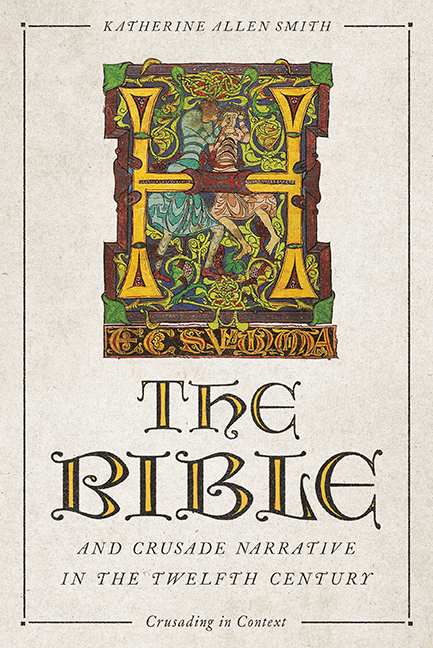Book contents
- Frontmatter
- Contents
- Acknowledgements
- List of Abbreviations
- Introduction
- Chapter 1 History and Biblical Exegesis in the Latin West
- Chapter 2 The Bible in the Chronicles of the First Crusade
- Chapter 3 Into the Promised Land
- Chapter 4 Babylon and Jerusalem
- Conclusion
- Appendix 1 Tables and Charts of Biblical References
- Appendix 2 List of Biblical References in the Texts
- Bibliography
- Index
Chapter 3 - Into the Promised Land
Published online by Cambridge University Press: 26 April 2020
- Frontmatter
- Contents
- Acknowledgements
- List of Abbreviations
- Introduction
- Chapter 1 History and Biblical Exegesis in the Latin West
- Chapter 2 The Bible in the Chronicles of the First Crusade
- Chapter 3 Into the Promised Land
- Chapter 4 Babylon and Jerusalem
- Conclusion
- Appendix 1 Tables and Charts of Biblical References
- Appendix 2 List of Biblical References in the Texts
- Bibliography
- Index
Summary
In the second half of the twelfth century two scribes at the Poitevin abbey of Saint-Pierre, Maillezais undertook a project that would allow their brethren to relive the first crusaders’ triumphs and tour the holy sites of the East without leaving the cloister. The product of their efforts, now preserved in Paris, Bibliothèque nationale (BN), ms. latin 4892, opens with an impressive array of excerpts from patristic and Carolingian historical, homiletic, and visionary literature that trace two closely entwined narratives: the rise of Christianity and the deeds of the Roman Church's preeminent defenders, the Franks. In the final sixty-seven folios, the manuscript's creators presented this story's climax, the First Crusade, carefully wrapped in layers of historical, geographical, and devotional context. Most modern readers have treated this assemblage of nine texts as a grab-bag, considering individual sources without addressing the logic behind what is, in fact, a quite thoughtful commemorative and devotional plan. Reading the collection holistically reveals how geographical knowledge and theology informed the reception of the First Crusade in the twelfth-century West, and reminds us of the importance of restoring early crusade narratives to their original contexts.
Maillezais's monks had every reason to be interested in crusading to the Holy Land in the later twelfth century. An earlier abbot, Peter, had helped preach the First Crusade and subsequently journeyed east, probably in the entourage of his patron, Duke William IX of Aquitaine (r. 1088–1127), with the iter's final wave. Since the abbey's cartulary has been lost, it is impossible to reconstruct its connections to individual crusaders, but, given both Abbot Peter's enthusiasm for the expedition and Maillezais's ties to the dukes of Aquitaine (who were also the counts of Poitou at this time), the community could have served as a recruiting hub in the Bas-Poitou. Certainly a large number of Poitevin knights participated in the First Crusade, and continued to fight in defense of Outremer in subsequent decades. The 1136 marriage of William IX's younger son, Raymond of Poitiers, to Constance, heiress of Antioch, and the participation of sizeable Poitevin contingents in the Second and Third Crusades ensured the ongoing relevance of Levantine affairs to the elite of the Bas-Poitou, and thus for the monasteries they patronized, throughout the twelfth century. This was the backdrop against which the compendium in BN latin 4892 was planned.
- Type
- Chapter
- Information
- The Bible and Crusade Narrative in the Twelfth Century , pp. 93 - 154Publisher: Boydell & BrewerPrint publication year: 2020

